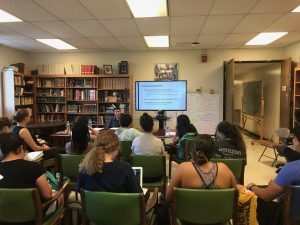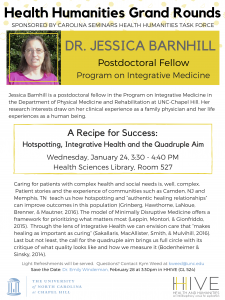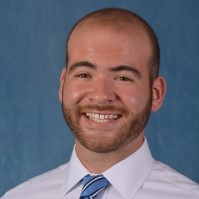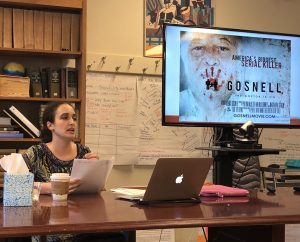2017-2018 HHGR
Sept. 27, 2017, “A Conversation on Curing Ulcerative Colitis” with Deren Pulley, UNC MPH Candidate, Health Behavior
 “Besides a brief overview of the technical side of the disease and the work he did with patients who shared his disease experience, Deren read a personal illness narrative to a full house in the HHIVE lab,” Nick Allen writes for our blog. “His autoenthnographical creative work compellingly deconstructed Deren’s identity in disease as a person who wears many hats–researcher, surgical emissary, and patient–and subsequently reconstructed them to give a rich picture of the complex and oftentimes contradictory world not only of living with Ulcerative Colitis after cure, but the larger topics of illness experience and autoethnographer as well.”
“Besides a brief overview of the technical side of the disease and the work he did with patients who shared his disease experience, Deren read a personal illness narrative to a full house in the HHIVE lab,” Nick Allen writes for our blog. “His autoenthnographical creative work compellingly deconstructed Deren’s identity in disease as a person who wears many hats–researcher, surgical emissary, and patient–and subsequently reconstructed them to give a rich picture of the complex and oftentimes contradictory world not only of living with Ulcerative Colitis after cure, but the larger topics of illness experience and autoethnographer as well.”
Nov. 1, 2017, “Music and Brain Plasticity: A Look at Music Therapy” with Dorita S. Berger of UNC’s Neuroscience Lab
“Have you ever wondered how different types of music can make you feel a certain way?” Destiny Ho asks on our blog. “Or how a certain song can bring you back to a particular time in your life, where specific memories vividly play out in your mind? Or perhaps, why a particular song gets stuck in your head and you can’t seem to get it out? On November 1st, Dr. Dorita Berger presented a Grand Rounds talk titled Music & Brain Plasticity: A Look at Music Therapy, which helps explain some of these questions. Dr. Berger stated that music is energy, an energy that has the ability to imitate the human emotional energy. The reflection of music as human emotional energy explains how particular types of music can influence and change human behavior, at times even acting as a healer, an animator, or a tool for communication.”
Nov. 29, 2017, “Socioeconomic Influences on the Brain and Immune System: Uncovering Mechanisms and Informing Interventions” with Keely Muscatell of UNC’s  Department of Psychology and Neuroscience
Department of Psychology and Neuroscience
“For many, physical health is something that is always in the back of their mind. From the top 10 weight loss tips on magazines to getting your flu shot every season, people are constantly thinking about their physical health” Akhila Boyina writes for our blog. “However, did you know that your social health can affect your physical health? This effect may not always be positive. Dr. Muscatell from the UNC Department of Psychology and Neuroscience gave a Grand Rounds talk around the topic of Socioeconomic Influences on Social Behavior and Physical Health.”
Jan. 24, 2018, “A Recipe for Success: Hotspotting, Integrative Health and the Quadruple Aim” with Jessica Barnhill of UNC’s Department of Physical Medicine and Rehabilitation
“Dr. Barnhill advocated for increased emphasis on post hospital care,” Kate Capitano writes for our blog. “She said that the solution to this problem involves “hotspotting,” a healthcare initiative that is “a data-driven process for the timely identification of extreme patterns in a defined region of the healthcare system. It is used to guide targeted intervention and follow-up to better address patient needs, improve care quality, and reduce cost.” This method creates a system that includes few paid individuals that branch out into unpaid, public volunteers who are trained to recognize “superusers” of the healthcare system. Along with this system, Dr. Barnhill also advocated for Authentic Healing Relationships, minimally destructive medicine, trauma informed care, and The Quadruple Aim.”
Feb. 28, 2018, “What Can Abortion’s ‘Back Alley’ Be?: Investigating the Rhetorical Possibilities of Clinical Space in Abortion Care with Emily Winderman of NC State’s Department of Communications
“On Wednesday, February 28, the HHIVE Lab hosted Emily Winderman for its Grand Round Series,” Kate Capitano writes for our blog. “Professor Winderman is an assistant professor in the Communications Department as North Carolina State University and is currently in the process of writing “The Back Alley: The Rhetorical History.” She visited the lab to discuss her findings in her search for the consequences of the use of the term the “back alley” and its transformation from describing a cement passageway behind a building to its description of the highly controversial issue of abortion.
The phrase was first referenced in an 1884 court case regarding a boundary dispute and has since evolved, describing everything from undesirable places in New York City to the evasion of government in abortions. Despite the actual concept it is describing, Professor Winderman stated that back alleys generally create feelings of disgust and distaste. The feelings, she emphasized, lead to a transfer of emotion from the word to the aspect that it is metaphorically linked to.”
March 22, 2018, “Digital Health Everywhere: Crossing Boudaries” with Brian Moynihan of the
UNC Health Sciences Library
April 25, 2018, “I Know Me: Using Photovoice to Explore the Lives of Complex Care Patients” with Ben Kaplan, MD Candidate at the UNC School of Medicine
“For the majority of the talk, Kaplan would present us with one of these images taken by a patient and then encourage discussion,” Carina Guerra writes for our blog. “After we had discussed our thoughts on an image, Kaplan would read excerpts from the  patient’s own description of that image. It quickly became apparent how effective each image was in depicting a patient’s obstacles in receiving care and their struggles as they attempt to be healthy. The patient descriptions that followed were even more provocative and informative as they added more layers of meaning to the overall story that was being told about that patient. One image revealed a plethora of full pill bottles all lined up with a caption expressing that this was how that patient started their mornings. Another image depicted a series of small hospital lockers with locks hanging on chains. This image was followed by a powerful description about how the patient had just come out of an MRI scan where he was told that he would need to start taking pain pills. The patient continues to describe how he won’t be taking those prescribed pills because he has had problems with addiction in the past. He concludes with, “I know me.” It almost seemed silly how simple it was to better understand a complex care patient: ask them, and they will tell you. Notably, there wasn’t a single image or caption that portrayed any degree of ease in these patients’ pursuit of healthiness.”
patient’s own description of that image. It quickly became apparent how effective each image was in depicting a patient’s obstacles in receiving care and their struggles as they attempt to be healthy. The patient descriptions that followed were even more provocative and informative as they added more layers of meaning to the overall story that was being told about that patient. One image revealed a plethora of full pill bottles all lined up with a caption expressing that this was how that patient started their mornings. Another image depicted a series of small hospital lockers with locks hanging on chains. This image was followed by a powerful description about how the patient had just come out of an MRI scan where he was told that he would need to start taking pain pills. The patient continues to describe how he won’t be taking those prescribed pills because he has had problems with addiction in the past. He concludes with, “I know me.” It almost seemed silly how simple it was to better understand a complex care patient: ask them, and they will tell you. Notably, there wasn’t a single image or caption that portrayed any degree of ease in these patients’ pursuit of healthiness.”



